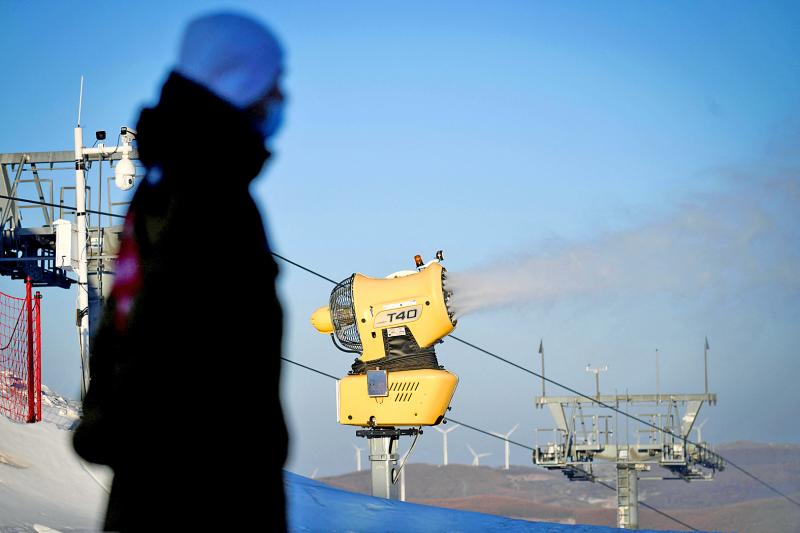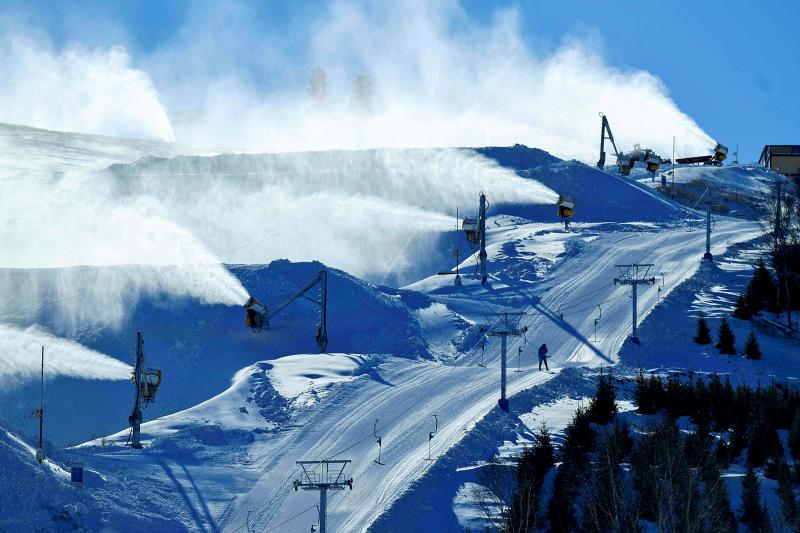Bright yellow turbines line the slopes of the Beijing Winter Olympics, spraying out the artificial snow needed for the Games to take place.
Man-made snow has been used to varying degrees since the 1980 Winter Olympics in Lake Placid, New York.
But February’s Beijing Games will depend almost entirely on artificial snow because they are happening in one of the driest parts of China.

Photo: AFP
With just five weeks until the Games begin, organizers are racing to coat the pistes in high-quality snow — a vast and complex task that critics say is environmentally unsustainable.
The venues use automated snow-making systems that monitor air temperature and humidity to maximize production.
Fed by local reservoirs, about 300 turbines — known as “snow guns” — mix water with compressed air before propelling the droplets into the air to form snow.

Photo: AFP
Workers then use truck-like vehicles called “snowcats” to spread the snow onto the pistes and sculpt jumps and turns.
Venues must ensure the snow meets precise standards of depth, hardness and consistency.
“The biggest challenge for us is maintaining uniform snow quality,” said Li Xin, deputy chief of mountain operations at the National Alpine Skiing Center in Yanqing (延慶), about 80km from Beijing.
Variations in the snow-making process “can cause snow quality to be too hard in some places and too soft in others, which could be dangerous for the athletes,” he told a press event at the site.
The stark white patches stand out vividly against Yanqing’s brown mountains, which see minimal natural snowfall. An International Olympic Committee evaluation report said that Zhangjiakou (張家口) and Yanqing — the Games zones hosting alpine skiing and snowboarding, among other outdoor events — “would rely completely on artificial snow.”
A 2020 study in science publication Nature warned that groundwater depletion in northern China was a “critical issue” and among the highest globally, due to intensive agricultural irrigation, rapid urbanization, and a dry climate.
This has meant water shortages for millions of Beijing residents and the water supply is likely to worsen in the future, researchers said.
Organizers at the Winter Olympics say the snow-makers are powered by renewable energy and will not damage mountain ecosystems, while the water they use will return to local reservoirs as the snow melts in spring.
The equipment’s automated systems reduce the kind of human error that can lead to wastage, said Florian Hajzeri, the China general manager for TechnoAlpin, the Italian company that supplies the machines.
With resorts worldwide turning to artificial snow to operate smoothly through the winter, “no matter which Olympics, there will always be snow-making systems for all of the venues,” he tsaid.
But experts say the reliance on man-made snow undermines Beijing’s pledge to hold a “green” Games.
Using large quantities of power and resources to create snow in the water-scarce region is “irresponsible”, said Carmen de Jong, a geography professor at France’s University of Strasbourg.
“We could just as well hold the Olympics on the moon or on Mars,” she said.

Towering high above Taiwan’s capital city at 508 meters, Taipei 101 dominates the skyline. The earthquake-proof skyscraper of steel and glass has captured the imagination of professional rock climber Alex Honnold for more than a decade. Tomorrow morning, he will climb it in his signature free solo style — without ropes or protective equipment. And Netflix will broadcast it — live. The event’s announcement has drawn both excitement and trepidation, as well as some concerns over the ethical implications of attempting such a high-risk endeavor on live broadcast. Many have questioned Honnold’s desire to continues his free-solo climbs now that he’s a

As Taiwan’s second most populous city, Taichung looms large in the electoral map. Taiwanese political commentators describe it — along with neighboring Changhua County — as Taiwan’s “swing states” (搖擺州), which is a curious direct borrowing from American election terminology. In the early post-Martial Law era, Taichung was referred to as a “desert of democracy” because while the Democratic Progressive Party (DPP) was winning elections in the north and south, Taichung remained staunchly loyal to the Chinese Nationalist Party (KMT). That changed over time, but in both Changhua and Taichung, the DPP still suffers from a “one-term curse,” with the

Jan. 26 to Feb. 1 Nearly 90 years after it was last recorded, the Basay language was taught in a classroom for the first time in September last year. Over the following three months, students learned its sounds along with the customs and folktales of the Ketagalan people, who once spoke it across northern Taiwan. Although each Ketagalan settlement had its own language, Basay functioned as a common trade language. By the late 19th century, it had largely fallen out of daily use as speakers shifted to Hoklo (commonly known as Taiwanese), surviving only in fragments remembered by the elderly. In

Lines between cop and criminal get murky in Joe Carnahan’s The Rip, a crime thriller set across one foggy Miami night, starring Matt Damon and Ben Affleck. Damon and Affleck, of course, are so closely associated with Boston — most recently they produced the 2024 heist movie The Instigators there — that a detour to South Florida puts them, a little awkwardly, in an entirely different movie landscape. This is Miami Vice territory or Elmore Leonard Land, not Southie or The Town. In The Rip, they play Miami narcotics officers who come upon a cartel stash house that Lt. Dane Dumars (Damon)